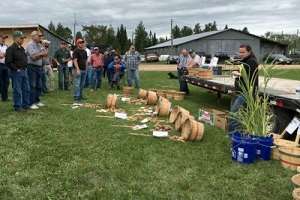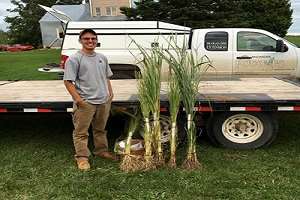By Monica Jean

I recently attended the Aug. 31, 2016, Upper Peninsula Potato Day, located at TJJ Farms in Cornell, Michigan, where Michigan State University Extension cover crop specialist Erin Hill spoke about the opportunity to grow cover crops in a potato rotation. Short-season, early harvest specialty crops like potatoes are ideal for incorporating cover crops due to growing time availability.
Commercial potato production requires intensive management practices that have been proven to be degradative to soil health. For example, treatments for nematodes in the past have utilized fumigation and intensive tillage practices. This treatment can have negative impacts on the beneficial soil microbe populations, in addition to the pests being targeted, which in turn may have negative impacts on their contributions to soil health including building soil structure, soil organic matter and nitrogen cycling. Past research has suggested that some cover crop species may reduce nematode pressure in potatoes, in addition to other tactics such as sanitation and improving soil quality.
Currently, research is being conducted in Michigan’s Lower and Upper Peninsulas to determine the best cover crop species to select and how to incorporate them into various potato rotations to find practical answers. In one of the trials, treatments consist of three pearl millet variates, sorghum-sudangrass, teff, annual rye grass and cereal rye no-till drilled into second year alfalfa at Kitchen Farms in Elmira, Michigan. In each trial plot, above and below ground biomass production, soil heath parameters and an evaluation of the impact on root lesion nematode populations will be measured. The subsequent potato crop grown in 2017 will be evaluated for tuber yield and quality and for the early-die syndrome. In another trial, located on Cousineau Potato Farm in Hardwood, Michigan, cover crop planting time, seeding rates and mowing times are being assessed for optimal biomass production.

Dependent on producer goals, there are many different cover crops to choose from for potatoes. In addition to clearly defining goals for cover crop use, other considerations include how it fits into your rotation (e.g., planting/harvesting times), cost, growth rate and impact on existing pest issues.
Buckwheat is an example of a cover crop that, when paired with manure and diverse crop rotations, has been found to help reduce potato early die, which is associated with the root lesion nematode as part of this complex. However, buckwheat has also been shown to act as a food source for aphids. This is a perfect example of how a cover crop can be beneficial or detrimental, depending on the current pest pressures.
The Midwest Cover Crop Council has an online cover crop selector tool to assist producers with deciding which cover crop species may help meet their goals. After selecting the field location, drainage information, and up to three goals, a graphic is generated that provides species options based on their likelihood to thrive in that environment and meet the goals. Detailed information sheets are also available by clicking on the cover crop names. The selector tool is available at Midwest Cover Crops Council Cover Crop Decision Tools.
Source: msu.edu